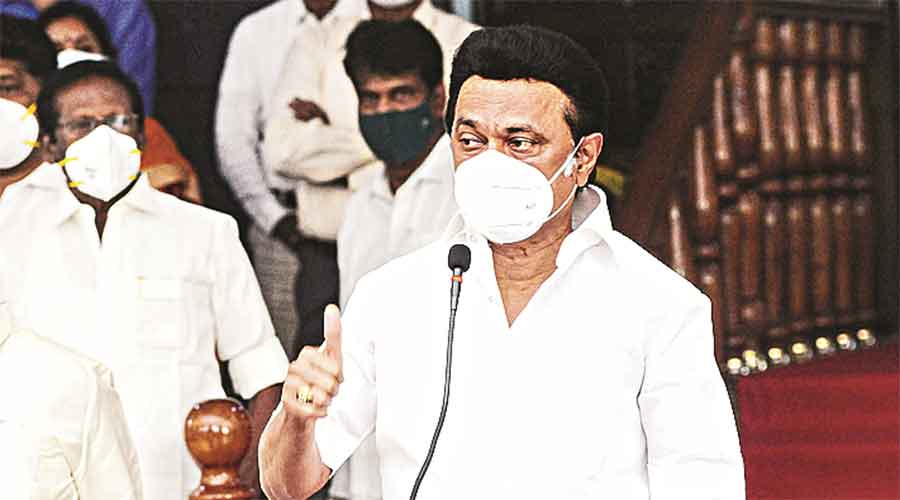Sir — Of the many announcements made by the governor of Tamil Nadu in his address to the members of the assembly, the government’s decision to form an economic advisory council was undoubtedly the master stroke (“Stalin attempts what Modi won’t”, June 22). The council would comprise eminent economists — the former governor of the Reserve Bank of India, Raghuram Rajan, the Nobel laureate, Esther Duflo, the former chief economic adviser, Arvind Subramanian, the development economist, Jean Drèze, and the former Union finance secretary, S. Narayanan.
It appears that the chief minister, M.K. Stalin, has taken an entirely different path compared to the various regimes in the past, keeping in mind only the welfare of the people of Tamil Nadu. His gentle behaviour during his meeting with the prime minister, Narendra Modi, where he raised the problems faced by the common man during the pandemic, is also laudable. Stalin seems to have realized that hearing out people of eminence in their respective domains is likely to bring good results and help lead the state to glory.
Tharcius S. Fernando,
Chennai
Sir — The Tamil Nadu government has constituted a five-member economic advisory council to guide the chief minister in managing the state’s economic and social policies. This is a welcome measure. The fiscal position of the state is poor, with debts amounting to over five lakh crore rupees.
Politics in the state has mostly been based on freebies — people are often paid in cash and kind by the political class in order to secure their votes, expending much of the money from the state’s coffers. This system must be stopped. The public exchequer should be used for developmental activities which, in turn, would provide employment opportunities for the youth.
Much of the state’s revenue comes from the sale of alcohol and the registration department. For a long time, the state has been planning to implement prohibition in a phased manner. In this situation, striking a balance between generating revenue and the expenditure of the state without taxing the people more is quite a challenge. It remains to be seen how the council resolves this dilemma.
Sravana Ramachandran,
Chennai
Sir — The decision of the chief minister of Tamil Nadu to constitute a ‘dream team’, comprising leading global economic experts, is welcome. The five-member committee was brought together by the state finance minister, Palanivel Thiaga Rajan, who, before his political stint, was an investment banker in the United States of America and Singapore.
While Raghuram Rajan and Arvind Subramanian are Tamilians, Esther Duflo has been working with Tamil Nadu through the Abdul Latif Jameel Poverty Action Lab. These relationships are likely to help the state in the future. Other states should follow in the footsteps of Tamil Nadu and appoint economic experts to help the government.
Bhagwan Thadani,
Mumbai
Sir — M.K. Stalin has wisely constituted a five-member economic advisory council to the chief minister. Some of the council members are critics of the Centre’s economic policies, as is the Dravida Munnetra Kazhagam. The economists in the council do not need an introduction.
Stalin is well aware of the dire financial condition of the state that he has taken over following the reign of the All India Anna Dravida Munnetra Kazhagam. According to the budget of 2020-21, Tamil Nadu has a debt burden of Rs 5.12 lakh crore. A white paper is supposed to be released in July this year, focusing on the true state of Tamil Nadu’s finances. It will be interesting to know about the contents of this white paper and the council members’ final recommendations, and see how those can be implemented with a hostile National Democratic Alliance government at the helm in Delhi.
K. Nehru Patnaik,
Visakhapatnam
Sir — Tamil Nadu has set an encouraging precedent by involving experts in the management of the state’s finances. It is unfortunate that in the present day, academics are often scorned. Political leaders have been inciting this trend. Blinded by their ego, they make economic decisions that end up harming the economy. This is true for the states as well as the Centre. The expertise of academics should not be taken lightly; they acquire these credentials after years of hard work.
The Centre would do well to follow the example of Tamil Nadu. It should try to undo the impact of rash economic measures such as demonetization and try to boost the country’s finances before it is too late.
Chandrani Ghosh,
Calcutta
Green future
Sir — Last week, the International Olympic Committee declared its plans to plant around 3,55,000 native trees in the western African countries of Senegal and Mali, which are supposed to host the Youth Olympics Games in 2026. Steps like this could go a long way in combating the problem of desertification. Given that people across the world follow events such as the Olympics, this would also send out a positive message. After all, land degradation is not a problem unique to Africa — around 30 per cent of India’s land is estimated to be degraded. Large-scale tree planting initiatives in all nations are the need of the hour.
Sangeeta Dutta,
Calcutta











